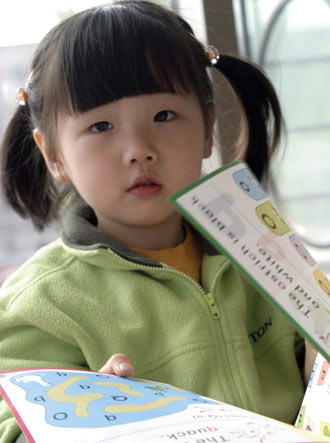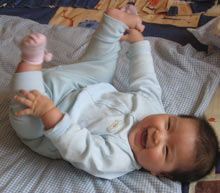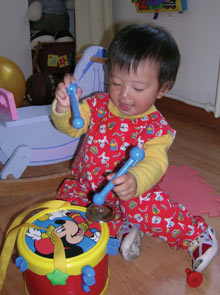| Investing in the Infant Intellectual |
| http://www.sina.com.cn 2005/06/27 17:14 thats China |
 Investing in the Infant Intellectual Children might need some protection from China's early education boom By Priscilla Jiao The duckling suddenly realizes the situation: Mom (who seems suspiciously like a drooling cat) wants to eat him for dinner. And so with a sad sigh, he accepts his fate and prepares to be eaten. The little yellow fellow so loves his mom, he is willing to make the ultimate sacrifice. This scene from the violent cartoon world of Tom and Jerry actually highlights an important feature of natural cognitive development in animals. Within 24 hours of being born, a duck will follow the very first thing he sees in the world, be that a wooden spoon, a person or a large blue-and-white tom cat sporting a white bib, sharpening a knife and fork. Imprinting, an especially rapid and relatively irreversible learning process that occurs early in the individual's life, was expounded upon by Nobel Prize winner Konrad Lorenz in 1973. Psychologically speaking, imprinting refers to any quick learning process that occurs during a certain phase in life, involving the learning of the characteristics of a certain stimuli. Filial imprinting, the process by which an infant comes to identify its parents, is the best known example. (This kind of imprinting is particularly prominent in birds who leave the nest shortly after hatching; thus Tom's ability to easily secure a potential duckling dinner.) Though most easily observed among animals, imprinting plays a major role in human mental maturation as well. That kids are commonly described as "impressionable" is no joke. From birth to 6 years old, a human brain阵 physical development is nothing short of spectacular. At age 1, the weight of a child's brain is nearly 60 percent that of an adult. By age 2, that weight has tripled to 75 percent of the typical adult weight, which is between 1300g and 1400g. One year later, the brain's weight is nearly the same as that of an adult. During this period of rapid physical development is a parallel period of mental formation. "The time between 0 and 3 years old is the golden time for early education," says Fang Fuxi, a professor of the Institute of Psychology, Chinese Academy of Science (CAS). "The right stimulation for the brain can be extremely helpful." This means early education isn't just child's play. But whereas ignoring a child during this highly important stage of development can be devastating, excess attention and emphasis on early education may also have a serious downside.
Baby brains = big bucks The 2000 Census found 70 million children aged between 0-3 in mainland China, of which 10.9 million lived in the cities. "In recent years, citizens have been spending more on education from their bank savings. Education has become the major expenditure for many families, outstripping pensions and housing. That's just not normal," says Li Peilin, deputy director and senior researcher, Institute of Sociology, Chinese Academy of Social Sciences (CASS). Beijing entrepreneur Liu Bo, 35, started up his small company Forkids (www.forkids.com.cn) last December. "I noticed many of my friends had been taking early education much more seriously. They all had extra money to spend. Yet they were confused by the countless products on the market and they splashed out tens of thousands on useless junk. I thought I could set up a company with a clear choice and simple service," says Liu. His Chinese-language website delivers door-to-door budget products to mothers and babies. In an article entitled "Educating China's Little Emperors," US BusinessWeek reported that the urban middle class focus on early education has created a market for companies peddling everything from health supplements to interactive English-language teaching software. "Some parents are spending US$10,000 per year for kindergarten. The market has really evolved," Dulce Lim, head of Asia-Pacific publishing at Walt Disney Hong Kong, was quoted as saying. Disney has reportedly sold 10 million comic books and 2.7 million books on the mainland. Last month, the company began pushing Baby Einstein, "a series of videos that bombard infants and toddlers with images and classical music that supposedly make them more receptive to learning," according to BusinessWeek. The article mentions Nong Nong Intermedia Group, Mattel, Hong Kong VTech Holdings, BabyCare, Johnson & Johnson and Nestle as companies looking to cash in on the early education boom. "Although no one knows exactly how big this market is, foreign companies are keen to sell to a potential customer base that grows by 22 million newborns every year," according to BusinessWeek. Parental passion for early education is booming in China. Lone "little emperors" command the attention of three couples: Parents and both sets of grandparents. Family change, allied with record economic growth, is making more and more parents invest in giving junior a jumpstart, regardless of how junior might feel about the idea.
"It's not completely because of the one-child policy," says Hao Weijiang, executive editor of China Women's News. "I think more importantly it stems from an evolution towards a more mature society, meaning people have recognized the value of individuality and care more about developing a child's intelligence, nurturing character and virtue." "As social competition becomes fiercer, parents worry about how their child can stand out from a crowd of increasingly multi-talented people," says Zhu Liqi, a professor of the Institute of Psychology, CAS. "And of course many urban Chinese these days appear to have much more money in their pocket." Parents can sometimes thrust their offspring onward and upward while barely pausing to ponder their own motives. "Some parents care much too much about early education," says Fang Fuxi, a professor of the Institute of Psychology, CAS. "It's like watering plants. If the earth is wet and you water too much, the plants cannot grow healthily, but die." The more Chinese characters Baby can memorize the better. But characters aren't anything special - Baby better be versatile. Witness little Wang play piano. Watch her parrot English phrases she does not understand. Look! She can dance in formation, on TV. Painting, music and dance classes are more popular than ever for 3-year-olds. None of this activity is necessarily a good thing or a bad thing, say experts. "Children of different ages have different characteristics. You cannot force them to do anything beyond their ability, like 'ba miao zhu zhang'," says Fang Fuxi, referring to the Chinese idiom of a farmer who in his haste to grow taller crops, pulls up all his seedlings. They all die. "Early education should not just be about intelligence," says Zhao Yongbi, a doctor at the attached hospital of Qingdao University Medicine Institute. "Parents often don't pay enough attention to psychological health."
|
| 【评论】【论坛】【收藏此页】【大 中 小】【多种方式看新闻】【下载点点通】【打印】【关闭】 |

